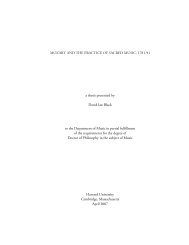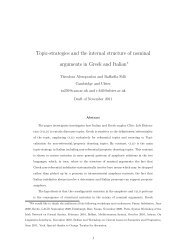Subjects, Topics and the Interpretation of Referential pro.
Subjects, Topics and the Interpretation of Referential pro.
Subjects, Topics and the Interpretation of Referential pro.
You also want an ePaper? Increase the reach of your titles
YUMPU automatically turns print PDFs into web optimized ePapers that Google loves.
<strong>the</strong> spirit <strong>of</strong> <strong>the</strong> present <strong>pro</strong>posal, it is tentatively suggested that this difference derives from<br />
independent core grammar <strong>pro</strong>perties <strong>of</strong> <strong>the</strong>se languages, <strong>the</strong> scrutiny <strong>of</strong> which cannot be<br />
h<strong>and</strong>led in this work.<br />
6. Fur<strong>the</strong>r Syntactic evidence<br />
6.1 Preverbal ‘subjects’ <strong>and</strong> raised datives<br />
Since <strong>the</strong> interpretation <strong>of</strong> referential <strong>pro</strong> depends on a matching relation with <strong>the</strong> Aboutnessshift<br />
Topic, when a NS is apparently bound by a ‘subject DP’, <strong>the</strong> latter is ei<strong>the</strong>r <strong>the</strong> local<br />
Aboutness Topic or <strong>the</strong> ‘repetition’ <strong>of</strong> a previously established one. Specifically, we have<br />
seen that continuing <strong>Topics</strong> are merged in <strong>the</strong> FamP <strong>pro</strong>jection, in which D-linked<br />
information is realized <strong>and</strong> interpreted by means <strong>of</strong> a low tone.<br />
This means that in a sentence like (43a) below, it is not <strong>the</strong> case that Carla is <strong>the</strong><br />
antecedent <strong>of</strong> <strong>the</strong> NS in <strong>the</strong> embedded (adverbial) clause. Ra<strong>the</strong>r, both <strong>the</strong> subject <strong>pro</strong> <strong>and</strong> <strong>the</strong><br />
Familiar Topic Carla are bound by a silent Aboutness-shift Topic in <strong>the</strong> matrix clause (cf.<br />
(43b)). 53<br />
(43) a. [mentre <strong>and</strong>ava a scuola] Carla mangiava una mela.<br />
while go.PAST.3SG to school Carla eat.PAST.3SG an apple<br />
‘While (she was) going to school, Carla would eat an apple.’<br />
b. [ShiftP [mentre <strong>and</strong>ava [<strong>pro</strong>k a scuola]] [FamP Carlak [AgrSP mangiava [<strong>pro</strong>k<br />
una mela]]]]<br />
It is clear that in a sentence like (43a) Carla cannot be a newly introduced referent. Such a<br />
sentence presupposes that Carla has been previously established as <strong>the</strong> Aboutness Topic, <strong>and</strong><br />
here repeated in a low Topic position. The presence <strong>of</strong> a null Topic is supported by data.<br />
Consider, for instance, <strong>the</strong> ungrammaticality <strong>of</strong> (44), in which a different Aboutness-shift<br />
Topic is overtly <strong>pro</strong>posed:<br />
(44) *Luisak [mentre <strong>and</strong>ava <strong>pro</strong>k a scuola] Carlaj mangiava <strong>pro</strong>j una mela.<br />
‘*Luisa, while going to school, Carla was eating an apple.’<br />
The <strong>pro</strong>blem in (44) is <strong>the</strong> interpretation <strong>of</strong> <strong>the</strong> matrix <strong>pro</strong>, given <strong>the</strong> mismatch between <strong>the</strong> ccomm<strong>and</strong>ing<br />
Familiar Topic (Carla) <strong>and</strong> <strong>the</strong> Aboutness-shift Topic (Luisa). Sentence (44)<br />
<strong>the</strong>refore shows that a Familiar Topic (like Carla in (44)) cannot satisfy <strong>the</strong> <strong>Interpretation</strong><br />
Requirement (38) when its referential features are not a copy (through re-Merge) <strong>of</strong> <strong>the</strong><br />
current Aboutness-shift Topic. As a matter <strong>of</strong> fact, in order to obtain <strong>the</strong> interpretation that<br />
‘Carla was eating an apple while Luisa was going to school’, <strong>the</strong> DP Luisa must be realized<br />
as a Topic in <strong>the</strong> adverbial clause (so that it can locally c-comm<strong>and</strong> <strong>the</strong> subordinate <strong>pro</strong>),<br />
while Carla can refer to <strong>the</strong> silent Aboutness Topic in <strong>the</strong> matrix C-domain:<br />
(45) [ShiftP [mentre [Luisak [<strong>pro</strong>k <strong>and</strong>ava a scuola]]] [FamP Carlaj [ <strong>pro</strong>j mangiava una<br />
mela]]]<br />
‘ when Luisa was going to school, Carla would eat an apple.’<br />
The assumption that a preverbal ‘subject’ serving as <strong>the</strong> antecedent for a NS is a Topic<br />
can also account for a number <strong>of</strong> syntactic asymmetries like <strong>the</strong> following:<br />
53 The position <strong>of</strong> <strong>the</strong> adverbial clause is immaterial for <strong>the</strong> purposes <strong>of</strong> <strong>the</strong> present analysis. For <strong>pro</strong>posals <strong>and</strong><br />
discussion, cf. Lipták (2005).<br />
29
















